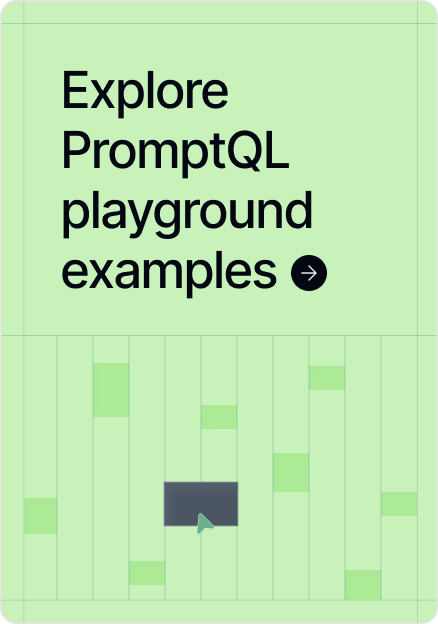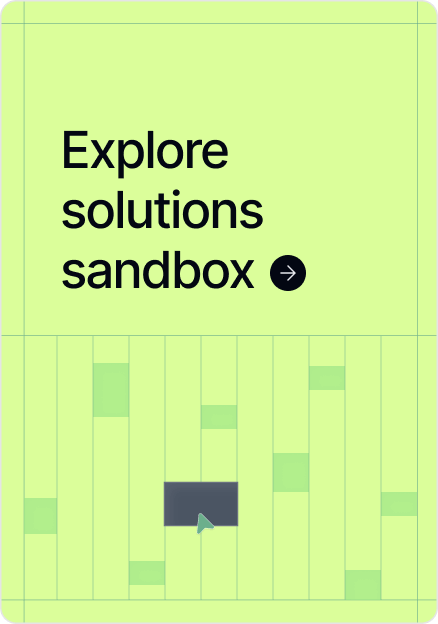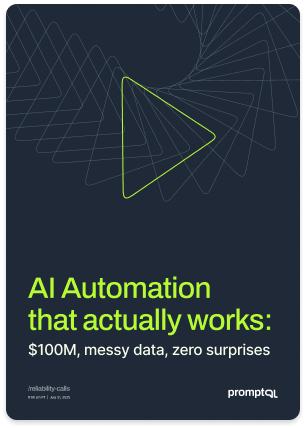Abstract
We demonstrate that PromptQL achieves 100% accuracy on the Database Querying & Numerical Computation tasks of the CRMArena-Pro benchmark—a result that dramatically outperforms state-of-the-art approaches which typically achieve 30-60% accuracy on complex enterprise tasks. This breakthrough stems from PromptQL's fundamental architectural innovation: the separation of query planning from execution, enabling deterministic and explainable AI operations on enterprise data. In this post, we analyze how PromptQL's approach differs from traditional tool calling, text-to-SQL, and RAG methodologies, and why this difference matters for enterprise AI reliability.
Introduction
The recently released CRMArena-Pro benchmark from Salesforce AI Research reveals a sobering reality: even leading LLM agents achieve only ~58% success rates on enterprise CRM tasks in single-turn scenarios, with performance degrading further to ~35% in multi-turn settings. This gap between AI capability and enterprise requirements has become a critical bottleneck in business AI adoption.
Today, we're excited to share that PromptQL achieved 100% accuracy (100/100 correct) on the Database Querying & Numerical Computation category of CRMArena-Pro's B2B single-turn tasks. This isn't just an incremental improvement—it represents a fundamental breakthrough in how AI systems can reliably interact with enterprise data.
The CRMArena-Pro Challenge
CRMArena-Pro is not your typical AI benchmark. Developed by Salesforce AI Research, it presents 19 expert-validated tasks across customer sales, service, and configure-price-quote (CPQ) scenarios. The benchmark specifically tests four core business skills:
- Database Querying & Numerical Computation: Formulating precise queries and performing calculations on structured data
- Information Retrieval & Textual Reasoning: Processing unstructured text sources
- Workflow Execution: Following business processes and rules
- Policy Compliance: Verifying adherence to company policies
What makes CRMArena-Pro particularly challenging is its use of realistic, interconnected enterprise data across 25 Salesforce objects with complex relationships—mirroring the real-world complexity that breaks traditional AI approaches.
PromptQL's Architectural Innovation
While traditional approaches attempt to execute queries within the LLM's context window, PromptQL takes a fundamentally different approach through three key innovations:
1. Separation of Planning and Execution
PromptQL separates the cognitive task of understanding what needs to be done from the mechanical task of doing it. The LLM creates a detailed query plan, but execution happens deterministically outside the LLM context:
User Query → LLM Planning → PromptQL DSL → Deterministic Execution → Results
This separation is crucial because it eliminates the accuracy degradation that occurs when LLMs try to process large amounts of data in-context.
2. Transparent Query Plans
Every PromptQL execution provides complete visibility into its reasoning and execution strategy. Consider this example from our benchmark run:
Query: "What was the most frequent problem faced by AI Cirku-Tech in the summer of 2020?"
PromptQL's Plan:
1. Find cases linked to the specified product during Summer 2020
- Join Case → OrderItem → Product2 to get product-related cases
- Filter for date range: June 1, 2020 to August 31, 2020
- Group by IssueId to count frequency
- Order by count descending to get the most frequent issue
2. Return only the IssueId with the highest count
This explainability is not just helpful—it's essential for enterprise trust and debugging.
3. Programmatic Execution with Intelligent Retry
When PromptQL encounters an error, it doesn't just fail—it adapts. In our second example, when a complex SQL query failed, PromptQL automatically:
- Diagnosed the issue
- Simplified the query approach
- Broke down the problem into smaller steps
- Successfully retrieved the answer
This resilience is built into the architecture, not bolted on as an afterthought.
Breaking Down the Success: A Detailed Analysis
Let's examine why PromptQL succeeded where others typically fail:
Case Study 1 (query 386): Complex Temporal and Join Operations
The first query required:
- Understanding domain-specific temporal concepts ("summer of 2020")
- Navigating a three-table join (Case → OrderItem → Product2)
- Performing aggregation and sorting operations
- Returning only the specific requested identifier
PromptQL handled this seamlessly by:
- Translating business concepts into precise date ranges
- Constructing an efficient SQL query with proper joins
- Executing deterministically with full result visibility
- Storing results in structured artifacts for reference
Link to the PromptQL run.
Case Study 2 (query 321): Adaptive Problem Solving
The second query showcased PromptQL's robustness:
- Initial complex query failed due to SQL execution error
- System automatically simplified the approach
- Progressively debugged by checking data availability
- Discovered no issues existed in the time window
- Provided comprehensive analysis of historical data for context
This adaptive behavior emerges from the separation of planning and execution—the LLM can reason about errors and adjust strategies without being constrained by context windows or probabilistic execution.
Link to the PromptQL run
Why PromptQL Succeeds Where Others Fail
Traditional Tool Calling: The Context Window Trap
Tool calling frameworks like LangChain execute within the LLM's context, leading to:
- Accuracy degradation as data volume increases
- Inconsistent results due to probabilistic execution
- Context window limitations preventing complex operations
Text-to-SQL: The Single-Shot Fallacy
Text-to-SQL approaches assume queries can be solved in one attempt, but:
- No mechanism for error recovery or query refinement
- Limited ability to handle complex business logic
- Poor performance on queries requiring multiple steps
RAG: The Relevance Limitation
RAG systems excel at retrieval but struggle with:
- Precise numerical computations
- Complex filtering and aggregation
- Maintaining accuracy across multi-step operations
PromptQL: Built for Enterprise Reality
PromptQL succeeds because it's designed for how enterprises actually work:
- Deterministic execution: Same input always produces same output
- Progressive refinement: Automatic retry with intelligent adaptation
- Unbounded computation: No context window limitations
- Full auditability: Complete execution traces for compliance
Key Technical Advantages
1. Structured Artifacts
PromptQL stores results in structured artifacts that persist beyond individual queries:
executor.store_artifact(
'most_frequent_issue',
'Most frequent issue ID for AI Cirku-Tech in Summer 2020',
'table',
result
)
This enables complex multi-step analyses and result reusability.
2. Intelligent Schema Navigation
PromptQL understands and navigates complex enterprise schemas:
- Automatically identifies join paths
- Handles null values and edge cases
- Optimizes query execution patterns
3. Business Context Awareness
The system seamlessly translates business concepts:
- "Summer 2020" → "2020-06-01 to 2020-08-31"
- "Past two weeks" → Dynamic date calculation
- Domain-specific terminology mapping
Implications for Enterprise AI
Our 100% accuracy on CRMArena-Pro's database tasks isn't just a benchmark victory—it validates a new paradigm for enterprise AI:
- Reliability is Achievable: With the right architecture, AI can match human accuracy on complex data tasks
- Explainability Enables Trust: Transparent query plans make AI decisions auditable and debuggable
- Adaptation Beats Perfection: Systems that can recover from errors outperform those that assume success
Looking Forward
This result on Database Querying & Numerical Computation tasks is just the beginning. We're currently evaluating PromptQL on the remaining CRMArena-Pro categories and will share comprehensive results across all 19 tasks in future posts. Early indicators suggest similarly strong performance in Workflow Execution and Policy Compliance tasks.
More importantly, these results validate our core thesis: enterprise AI reliability isn't about building perfect models—it's about building systems that separate planning from execution, provide transparency, and adapt to real-world complexity.
Conclusion
PromptQL's 100% accuracy on CRMArena-Pro database tasks demonstrates that the enterprise AI reliability gap can be closed. By fundamentally rethinking how AI systems interact with data—separating planning from execution, providing complete transparency, and building in intelligent adaptation—we can build AI systems that businesses can trust with their most critical operations.
The path forward is clear: move beyond the limitations of in-context execution and embrace architectures designed for enterprise reality. The results speak for themselves.
We'll be sharing more detailed results across all CRMArena-Pro categories in upcoming posts. To learn more about PromptQL and how it can transform your enterprise AI initiatives, visit promptql.io.



